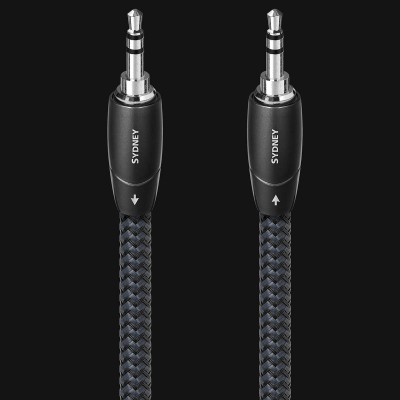Sydney 3.5mm Mini M > M
Analogue Audio Interconnect Cable
Connect a wide range of audio electronics with this AudioQuest Sydney 3.5mm Mini analogue interconnect, meticulously designed for outstanding flexibility and versatility. Solid Perfect-Surface Copper+ (PSC+) conductors minimise distortion, Polyethylene Air-Tube insulation preserves dynamic contrasts, and a Carbon-Based Noise-Dissipation efficiently dissipates high-frequency noise for cleaner, clearer, more naturally beautiful music.
Key Features & Technology Explained
Solid Conductors
Solid conductors prevent strand-interaction, a major source of dynamic distortion in cables.
Perfect-Surface Copper+ Metal
AudioQuest's best copper. To the greatest extent presently possible, extreme-purity Perfect-Surface Copper+ (PSC+) conductors minimise distortion caused by grain boundaries.
Carbon Based 3 Layer Noise Dissipation
Alternating layers of metal and carbon-loaded synthetics "shield the shield," absorbing and reflecting most RF energy before it reaches the layer attached to ground.
Polyethylene Air-Tubes Insulation
Polyethylene Air-Tube's low-loss, high-air content design minimises the out-of-focus effect seen in other materials, ensuring optimal performance.
Direction Controlled
All conductors controlled for RF-noise directionality.
Solid Perfect-Surface Copper+ (PSC+) Conductors
Solid conductors prevent electrical and magnetic strand-interaction. PSC+ Solid-Copper minimises distortion caused by grain boundaries and maximises linear RF Noise-Dissipation.
Carbon-Based 3-Layer Noise-Dissipation
It's easy to accomplish 100% shield coverage. Preventing captured Radio Frequency Interference (RFI) from modulating the equipment's ground reference requires AQ's Noise-Dissipation System (NDS). Traditional shield systems typically absorb and then drain noise/RF energy to component ground, modulating and distorting the critical "reference" ground plane, which in turn causes a distortion of the signal. NDS's alternating layers of metal and carbon-loaded synthetics "shield the shield," absorbing and reflecting most of this noise/RF energy before it reaches the layer attached to ground.
Polyethylene Air-Tube Insulation
Any solid material adjacent to a conductor is actually part of an imperfect circuit. Wire insulation and circuit board materials all absorb energy. Some of this energy is stored and then released as distortion. AudioQuest, however, uses Polyethylene Air-Tube Insulation on both conductors, for increased geometry stabilisation and improved clarity. Because air absorbs next to no energy and Polyethylene is low-loss and has a benign distortion profile, Polyethylene Air-Tube Insulation, with its high air content, causes much less of the out-of-focus effect common to other materials.
Asymmetrical Double-Balanced Geometry
Purpose designed for single-ended applications, Asymmetrical Double-Balanced Geometry offers a relatively lower impedance on the ground for a richer, and more dynamic experience. While many single-ended cable designs use a single path for both the ground and the shield, Double-Balanced designs separate the two for cleaner, quieter performance.
Cold-Welded, Direct-Silver Plated Pure Purple Copper Terminations
Direct-Silver Plating is optimised for sound, using no underlying layer of distortion-causing nickel, while the highly effective cold-weld process avoids sound-degrading solder.
| Specifications | |
| Metal | ZERO: Solid Perfect-Surface Copper+ (PSC+) / BASS: Solid Perfect-Surface Copper+ (PSC+) |
| Noise Dissipation | Carbon-Based |
| Geometry | Asymmetrical Double-Balanced |
| Insulation | Polyethylene Air-Tubes |
| Terminations | Cold-Welded, Direct-Silver-Plated Purple Copper |
| Signal Type | Analogue |
| Jacket | Dark Gray on Black Braid |
| Sold As | Single Cable |
Write a Review
Note: If reviewing a product that has variations such as colour or length, please include this information at the start of the review. For example "Colour: Red" or "Cable Length: 2m" etc.
Your Name:Your Review: Note: Plain text only (HTML is not translated).
Rating: Bad Good

